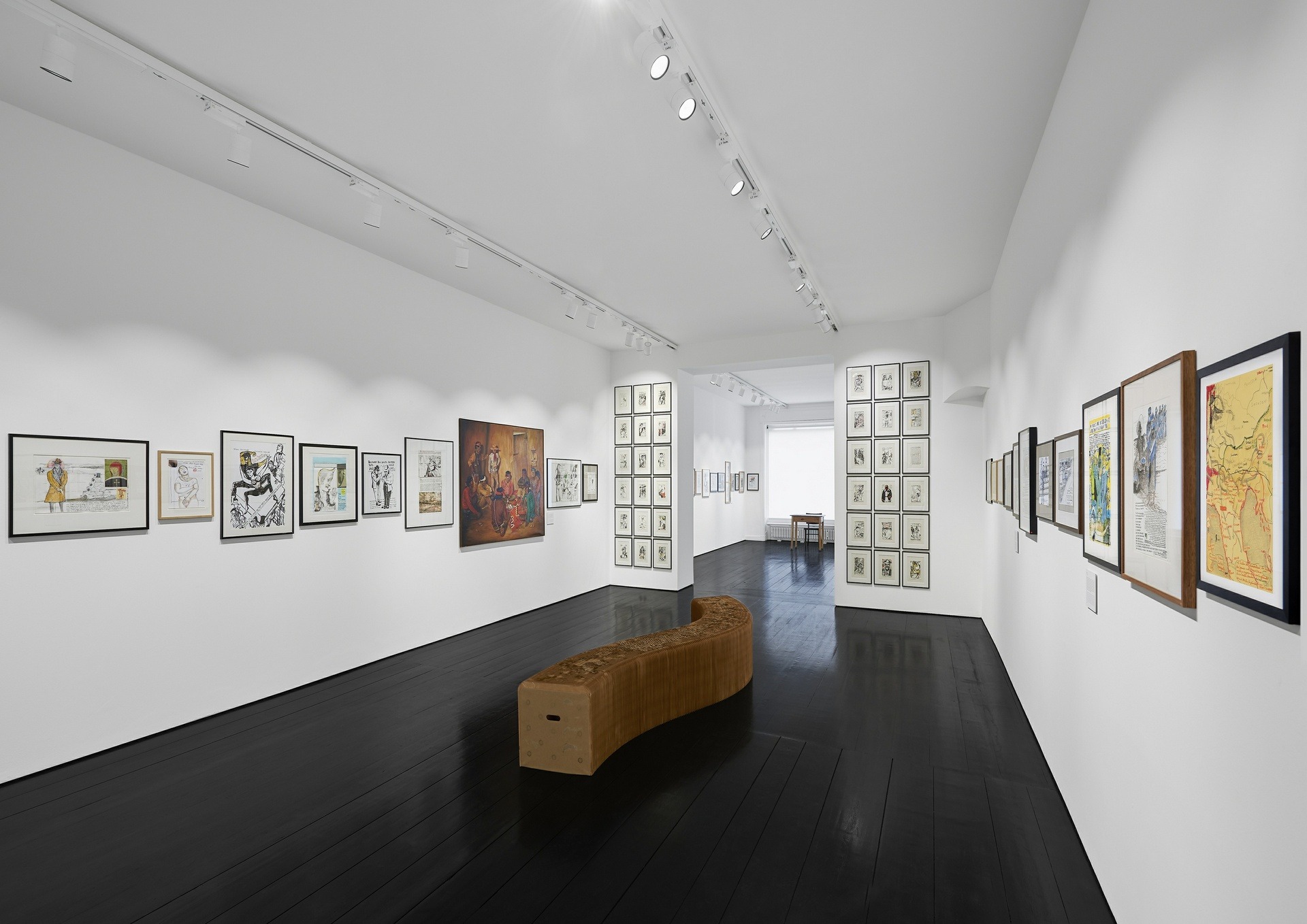Michel Würthle
Le cinéma de la vie
08 - 22 Sep 2018
MICHEL WÜRTHLE
Le cinéma de la vie
8 – 22 September 2018
On the occasion of Michel Würthle’s 75th birthday, Contemporary Fine Arts is pleased to present »LE CINÉMA DE LA VIE« an exhibition of Michel Würthle’s drawings made from 1993 to today. Fabrice Hergott, Director of the Musée d‘Art Moderne de la Ville de Paris and an admirer of Michel Würthle as a person and an artist, selected the drawings and wrote the accompanying catalogue essay. Co-founder and proprietor of the iconic PARIS BAR and the Kreuzberg restaurant EXIL before that, Michel Würthle has hosted a legendary group of artists for over 45 years. Würthle’s series of drawings recalls and reimagines a life instructed by his experience of others.
Michel Würthle was at the centre, at the helms, of the spaces that defined culture in West Berlin. In 1972 he and his friends Ingrid and Oswald Wiener opened EXIL. The restaurant inaugurated a new era as a local, almost provincial scene, became a vibrant and international meeting place, restoring Berlin’s reputation as an open and cosmopolitan city for night owls.
In 1979, Michel Würthle sold EXIL to buy PARIS BAR. With his self-deprecating air, tireless humour and joie de vivre, he continued to draw a coterie of the best artists to this new haunt. The circle of artists and friends that frequented PARIS BAR included Joseph Beuys, Dieter Roth, Walter Pichler, Richard Hamilton, Eduardo Paolozzi, Georg Baselitz, Markus Lüpertz, Maria Lassnig and Martin Kippenberger, among others. PARIS BAR was, still is, a place for lingering, a place where punk will never die, a promised land, an icon of Berlin.
Michel Würthle has always been more than a host: a friend, an observer, and an artist. The „Prince of Zinc“, as he calls himself, mines his memories, rendering them in black ink. At times with a touch of colour or collaged photograph, his drawings appear as a chronicle. They say the essential, accompanied by a handwritten legend, under which he himself sometimes appears as an imposed figure. We see EXIL and PARIS BAR from the inside in the flurry of waiters, the lingering artists, the lone dishwasher who takes out the trash every morning before dawn. Traces of Beckmann’s semi-nocturnal world, Dix and Grosz’ grit and Roland Topor’s surrealism are palpable. The drawings become a dreamscape as everyday encounters evolve into nocturnal reveries, mysterious journeys, adventures with cowboys and Indians.
In juggling memories and encounters, jokes and fantasies, the "Prince of Zinc" delineates what make us human. Love and friendship, ambition and greed, jealousy and revenge. He outlines the melancholy moments that lurk behind splendour. He lays bear how he lives, navigating joy and adversity. How he observes and admires what life parades before him.
Le cinéma de la vie
8 – 22 September 2018
On the occasion of Michel Würthle’s 75th birthday, Contemporary Fine Arts is pleased to present »LE CINÉMA DE LA VIE« an exhibition of Michel Würthle’s drawings made from 1993 to today. Fabrice Hergott, Director of the Musée d‘Art Moderne de la Ville de Paris and an admirer of Michel Würthle as a person and an artist, selected the drawings and wrote the accompanying catalogue essay. Co-founder and proprietor of the iconic PARIS BAR and the Kreuzberg restaurant EXIL before that, Michel Würthle has hosted a legendary group of artists for over 45 years. Würthle’s series of drawings recalls and reimagines a life instructed by his experience of others.
Michel Würthle was at the centre, at the helms, of the spaces that defined culture in West Berlin. In 1972 he and his friends Ingrid and Oswald Wiener opened EXIL. The restaurant inaugurated a new era as a local, almost provincial scene, became a vibrant and international meeting place, restoring Berlin’s reputation as an open and cosmopolitan city for night owls.
In 1979, Michel Würthle sold EXIL to buy PARIS BAR. With his self-deprecating air, tireless humour and joie de vivre, he continued to draw a coterie of the best artists to this new haunt. The circle of artists and friends that frequented PARIS BAR included Joseph Beuys, Dieter Roth, Walter Pichler, Richard Hamilton, Eduardo Paolozzi, Georg Baselitz, Markus Lüpertz, Maria Lassnig and Martin Kippenberger, among others. PARIS BAR was, still is, a place for lingering, a place where punk will never die, a promised land, an icon of Berlin.
Michel Würthle has always been more than a host: a friend, an observer, and an artist. The „Prince of Zinc“, as he calls himself, mines his memories, rendering them in black ink. At times with a touch of colour or collaged photograph, his drawings appear as a chronicle. They say the essential, accompanied by a handwritten legend, under which he himself sometimes appears as an imposed figure. We see EXIL and PARIS BAR from the inside in the flurry of waiters, the lingering artists, the lone dishwasher who takes out the trash every morning before dawn. Traces of Beckmann’s semi-nocturnal world, Dix and Grosz’ grit and Roland Topor’s surrealism are palpable. The drawings become a dreamscape as everyday encounters evolve into nocturnal reveries, mysterious journeys, adventures with cowboys and Indians.
In juggling memories and encounters, jokes and fantasies, the "Prince of Zinc" delineates what make us human. Love and friendship, ambition and greed, jealousy and revenge. He outlines the melancholy moments that lurk behind splendour. He lays bear how he lives, navigating joy and adversity. How he observes and admires what life parades before him.

